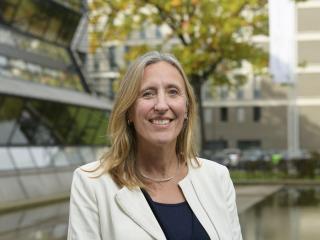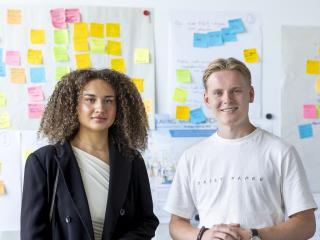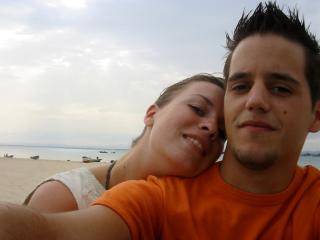University-wide academic collaborative centers: A matter of give and take
When it comes to addressing the really major issues, collaboration involving several disciplines and societal partners is required. With that in mind, Tilburg University has established a series of university-wide ‘academic collaborative centers’ to work on themes such as Digital Health & Mental Wellbeing. This particular center has identified a wonderful mission for itself: ‘To make working on your mental health the most normal thing in the world by the year 2030.’
Using scientific progress to benefit society used to be known as ‘valorization’. Nowadays we use the term ‘impact’. But whatever we choose to call it, the fact is that expectations of our universities are higher than ever in this regard. Society is facing numerous major issues, such as the climate challenge, biodiversity and the growing gap between rich and poor. And people are looking to science for solutions.
Marieke Schoots, program director of the Wellbeing impact program, is helping to get the program off the ground at Tilburg University. In her view, a lot of the groundwork is already in place. “We have so many dedicated scientists who want to make a difference to society. The challenge is that it wasn’t being prioritized. It didn’t have the same status as research, for example. Our dedicated colleagues had to work on these challenges on the side.” There was another challenge, too: generally, major social challenges cannot be solved with a ‘magic bullet’ or through progress in one single academic discipline. “Collaboration across several disciplines is needed,” explains Schoots. “In our organization, that collaboration does not happen of its own accord. We even have an expression for this: the world has its problems and a university has its faculties.”
The academic collaborative center is neutral territory, where participants work together toward a shared societal goal
Program director of the Wellbeing impact program Marieke Schoots
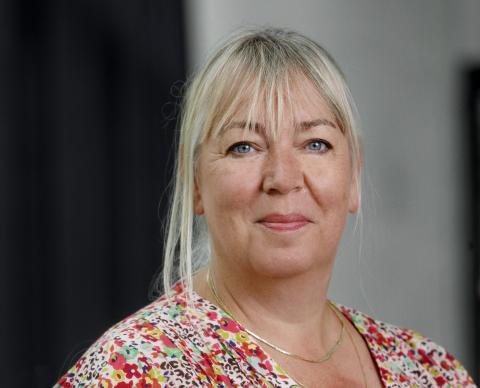
Generous budget
In the past, several looser impact programs have proved unable to achieve coordination between all the various schools of the university. But the current Wellbeing impact program has changed that. This program is much more structured and embedded in the organization. The program has a generous budget of nine million euros and can count on support from all the schools, including when it comes to staffing. Interdisciplinary collaboration is ingrained in the way we work. In each of the university-wide academic collaborative centers – Governance and Management for Wellbeing, Digital Health & Mental Wellbeing, Climate & Energy and Inclusive Labor Market – the participation of various disciplines is a strict condition. The same applies to working with partners from wider society. A community of Tilburg University scientists is drawing up a research and development agenda involving societal partners, and making agreements regarding collaboration.
Schoots explains that Tilburg University is aiming for a wide range of societal partners for each academic collaborative center. This will ensure that the research and development agenda is based on input from diverse perspectives. Schoots: “A partner signs up to take part for four years, with the option of exiting earlier after two years. The academic collaborative center is neutral territory, where participants work together toward a shared societal goal.”
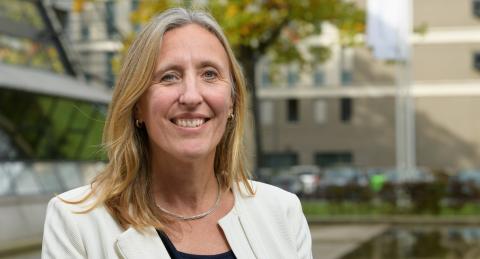
The university and the societal partners have to be on an equal footing
Professor of sustainable innovation in mental health Inge Bongers
Equality
To get an idea of how an academic collaborative center works in practice, we asked Inge Bongers of Tilburg School of Social and Behavioral Sciences (TSB). She is a professor of sustainable innovation in mental health – an ‘implementation specialist’ who works on making technological and social innovations a success. Together with Emiel Krahmer of Tilburg School of Humanities and Digital Sciences, she leads the academic collaborative center for Digital Health & Mental Wellbeing. Bongers has plenty of experience with the phenomenon of academic collaboration centers. She has been involved in Tranzo’s care and wellbeing academic centers since its foundation in 2000. Unlike the new wider academic collaboration centers, those involved just one school – Tilburg School of Social and Behavioral Sciences.
So what has she learned from all her experience with Tranzo? “I have seen how important equality is in the relationships between the partners. There has to be an acknowledgement of each other’s role and expertise, and the university and the societal partners have to be on an equal footing. The same goes for the various disciplines that take part in the university-wide collaborative centers.” According to Bongers, a second requirement for success is collaboration on a structural basis and learning about one another’s perspective. “A good example at Tranzo is the academic collaborative center Mental Health Care, which has existed for twenty years. It includes the major mental health organizations that operate in our area. A long-term partnership like that helps everybody to learn what works and what doesn’t.” Bongers believes that, over time, the partners learn how to work on questions that are specific to them as well as on the general interest at the same time.
In 2030, working on your mental health should be the most normal thing in the world
Professor of sustainable innovation in mental health Inge Bongers
Minor in digital health
The academic collaborative center for Digital Health & Mental Wellbeing began work in January. The partners are working on a collaborative agenda around the themes of: data and digitalization; prevention, monitoring and self-monitoring; technical developments; and implementation. There are plans for collaboration on both research and education. For instance, the development of a university-wide digital health minor is being considered.
A concrete research proposal has already emerged from the center. This concerns the development of a digital self-management tool for those with a serious psychiatric condition. This clearly shows the added value of collaboration between disciplines and partners, says Bongers. “For that research project, we need psychologists who know what the triggers for relapse are. But we also need data scientists who can work on how to collect data and build a tool that will detect those triggers, and we need an implementation expert to decide when and how clients and professionals will use that tool. The project includes providers of mental health services such as GGZ Breburg and GGZ Eindhoven, as well as the City of Tilburg. The aim is for this new tool to actually become part of everyday mental healthcare practice in the future.”
Digital Health & Mental Wellbeing is on the right track, says Bongers. She is very happy with the mission they have chosen: ‘To make working on your mental health the most normal thing in the world by the year 2030.’ The target group is therefore clearly larger than mental health patients alone – it is actually relevant to everybody living in the Netherlands. And Bongers is also happy with the choice of mental wellbeing in its broader sense. “That is a highly relevant issue for today’s society, and people are hungry for solutions.”
This academic collaborative center brings together a whole range of healthcare disciplines that otherwise would hardly come into contact, such as cancer care and mental health care
Epidemiologist Lonneke van de Poll
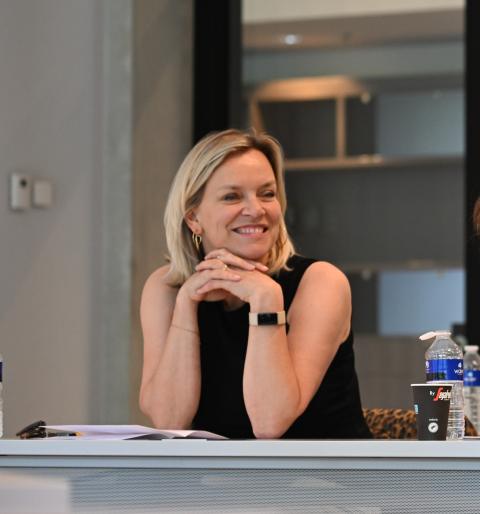
Sparring partners
The Antoni van Leeuwenhoek Hospital is expected to join Digital Health & Mental Wellbeing as an official partner shortly. Epidemiologist Lonneke van de Poll, who is affiliated with the Antoni van Leeuwenhoek Hospital, already has experience of working with university medical centers and universities of technology. But she believes that working with a more socially oriented university can also yield significant added value. Her work as an epidemiologist mainly involves collaborating with fundamental researchers from the field of medicine. “Their main focus is the eradication of cancer from the world. That is a very worthy aim, but we also conduct research into living with cancer and quality of life. That work often involves challenges that require input from other disciplines. This is a frequent struggle – for example, in my own research into aftercare for cancer patients by means of a digital tool. We run into issues such as: how do we reach vulnerable patients and/or patients with low health literacy? And how can we predict which patients are at risk of mental-health issues? Or how do we ensure that a tool actually gets used?”
At the academic collaborative center for Digital Health & Mental Wellbeing, Van de Poll expects to be able to obtain knowledge that she can apply in research. In the past, she has benefited greatly from working with Tilburg professor Emiel Krahmer, who is a specialist in improving communication between computers and humans. “But he is certainly not the only one at the center who could help us. I hope to find sparring partners who can help us test certain things, or who can tell us about new developments that we’re not yet aware of. I also see opportunities for joining forces to set up studies that are important to multiple partners, such as research into how to reach vulnerable groups better. As partners, we can all benefit so much from working together and sharing our knowledge and experience. This academic collaborative center brings together a whole range of healthcare disciplines that otherwise would hardly come into contact, such as cancer care and mental health care.” She also thinks she has plenty to offer the other partners and the university, such as knowledge or internships. According to Van de Poll, the Antoni van Leeuwenhoek Hospital is an extremely interesting learning environment for Tilburg students, where they can help to improve processes, for instance. “We certainly aren’t just involved with the academic collaborative center for what we can get out of it – we also want to make our own contribution.”
Academic collaborative centers
Tilburg University’s Program for Broad Prosperity uses the academic collaborative centers as its main instrument. Four of these have now been established.
Governance and Management for Wellbeing
This center focuses on monitoring and measuring the impact of policy on wellbeing. How can public and private organizations achieve better wellbeing and broader prosperity?
Partners: City of Tilburg, Midpoint Brabant, Province of Noord-Brabant, PON-Telos, VBG, Municipality of Waalwijk
Digital health & Mental Wellbeing
This center looks for ways to improve mental wellbeing using digital tools and resources. Its mission is: ‘To make working on your mental health the most normal thing in the world by the year 2030.’
Partners: Zorg van de Zaak, GGZ Breburg, GGZ Eindhoven, City of Tilburg, Elisabeth-Tweesteden Hospital and Antoni van Leeuwenhoek Hospital.
Climate & Energy
This center aims to help develop expertise to enable the transition to a more sustainable way of living and working. One important challenge is: how can we achieve an energy transition that is socially equitable?
Partners: Alliander, Essent, Vereniging Eigen Huis, City of Tilburg, Province of Noord-Brabant, Stedin, Netherlands Enterprise Agency, Heijmans, Midpoint Brabant, Enexis, Avans, Pon-Telos.
Inclusive Labor Market
This center focuses on uncertainty around work and income, and examines how we can address that uncertainty. The participants are seeking new infrastructure for the labor market by 2030, so that everybody is able to work and move from job to job.
Partners: Total Care (CSU), ING, NS, KLM, UWV, Randstad, Rabobank, CNV, Philips and Achmea.
For more information about the Wellbeing program and the centers:
Date of publication: 11 September 2023

